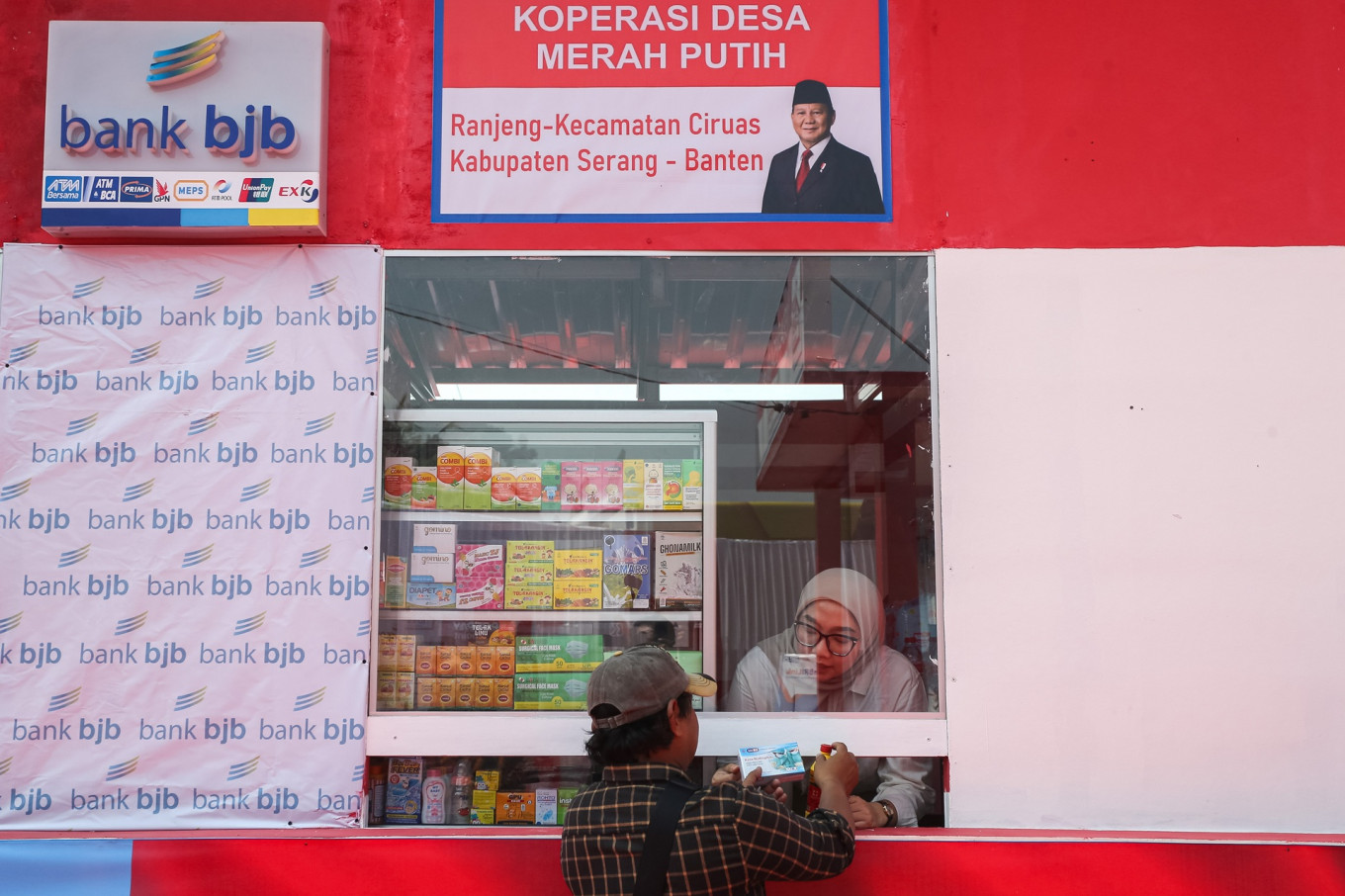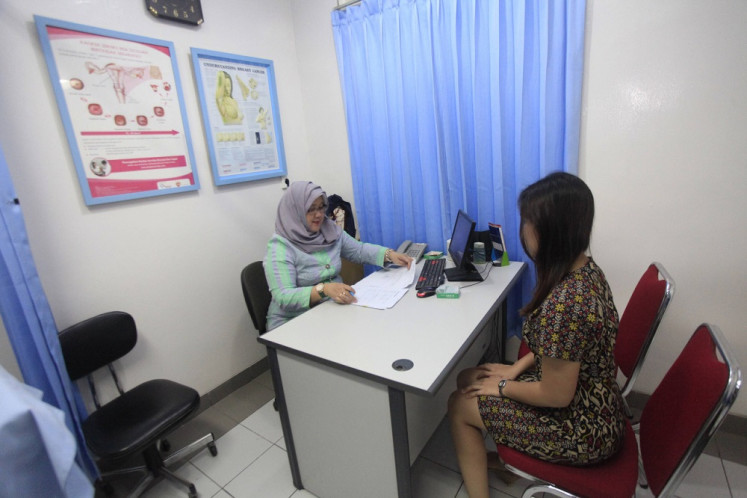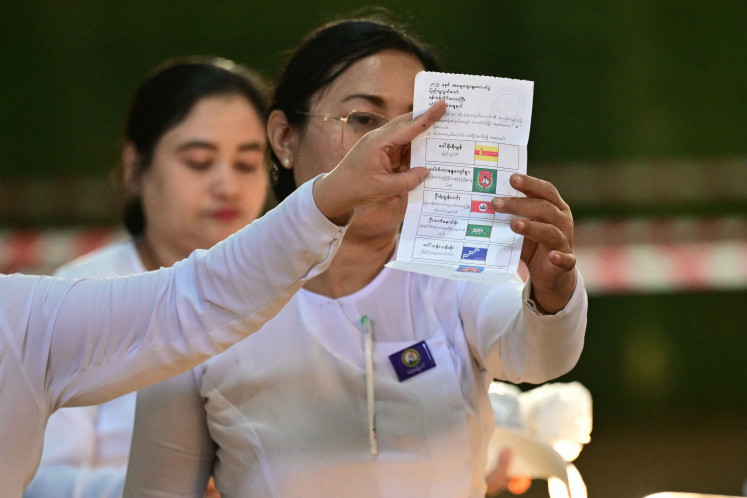Popular Reads
Top Results
Can't find what you're looking for?
View all search resultsPopular Reads
Top Results
Can't find what you're looking for?
View all search resultsGive cooperatives a chance
The newly launched KDMP initiative must have a strategy as equally grand as its scale to not just revive co-ops, but to lift them so they become an active economic pillar.
Change text size
Gift Premium Articles
to Anyone
 A clerk serves a customer at the stall of a pharmacy cooperative in Banten’s Serang regency on July 21, 2025, when a massive launch event was held simultaneously in selected regions nationwide to inaugurate more than 80,000 co-ops under President Prabowo Subianto’s Red and White Rural Cooperative (KDMP) initiative. (Antara/Angga Budhiyanto)
A clerk serves a customer at the stall of a pharmacy cooperative in Banten’s Serang regency on July 21, 2025, when a massive launch event was held simultaneously in selected regions nationwide to inaugurate more than 80,000 co-ops under President Prabowo Subianto’s Red and White Rural Cooperative (KDMP) initiative. (Antara/Angga Budhiyanto)
W
e highly commend President Prabowo Subianto for his grand initiative to launch cooperatives in every single village in the country, totaling more than 80,000 nationwide, as a way to empower as many people as possible so they can improve their welfare while growing rural economies.
The main ceremony to kick off thousands of cooperatives, held on Monday in the Central Java town of Klaten, must inevitably be grand also, given their potential impact on people’s lives and prosperity, as well as the national economy as a whole.
But for some reason, this important message fell flat on that symbolic day. Instead, the launch ceremony was seen as a token gesture paying lip service to an associative scheme that previous governments have neglected, to the point that the role of cooperatives were vastly diminished and even seen as an economic burden at times.
Our first vice president Mohammad Hatta might be turning in his grave, seeing that his concept for “cooperatives to be the sokoguru [main pillar] of the national economy” has been either dropped or used as mere political propaganda.
Still, it must be acknowledged that Monday’s launch was missing a grand strategy of what exactly the government hopes to achieve by setting up these cooperatives on an annual fund of Rp 1 billion (US$61,000) for the first five years.
Without clear objectives and a road map on how to resuscitate cooperatives, we are simply pouring money down the drain.
As with the previous “3 million homes” and free nutritious meal programs, the Red and White Rural Cooperatives (KDMP) initiative seems to have been a rush job, seeing as Prabowo only issued the relevant decree on its establishment in March. The launch organizers even missed the optimal date by a few days, which was supposed to be on July 12 to coincide with Indonesian Cooperatives Day.
And of the 80,081 newly registered KDMPs, only a few hundred have opened their doors to date.
Prior to the new initiative, the country had over 130,000 registered co-ops with around 26 million members, of which 40 percent are dormant and the rest provide savings and loans facilities. Very few are engaged in trading and manufacturing.
Meanwhile, it’s not clear how much these active co-ops contribute to the national economy, with officials giving figures that range between 1 and 5 percent of gross domestic product, though the upper limit seems an exaggeration or a wishful projection.
Regardless, everyone knows about the potential economic contributions of cooperatives to overall national prosperity in terms of welfare, jobs and income.
Brazil, Canada and Norway offer examples of successful co-op movements. Our own has seen better days, and we continue to cherish the traditional spirit of gotong royong (mutual cooperation), even though we no longer practice it as our business dealings become increasingly driven by individualism.
Studies point to three reasons for the declining role of cooperatives in Indonesia: poor managerial and organizational skills, falling membership and the rise of corporatism. The grand strategy for rural cooperatives must address all three.
Along with the huge capital injection, the government must provide training to build the capacity of members as well as implement close supervision to ensure accountability of taxpayers’ money. The proposal for state banks to support cooperatives is most welcome.
Ultimately, the KDMP initiative has to be a bottom-up movement with minimum government intervention. It must be designed to ensure voluntary participation so the new crop of co-ops is financially and operationally sustainable.
Where the government should intervene is in policy. A truly grand strategy would put cooperatives, not corporations, at the center of its economic policy.
Successive cabinets over the decades, including the current one, have been filled with business lobbyists who ensured policies that favor the corporate world. We might have a minister of cooperatives, but rarely is this role filled by a strong figure with the necessary competencies. Instead, the job is usually given to politicians from one of the junior parties in the coalition government.
If we are serious about elevating cooperatives as an economic pillar, we should stop treating them as an afterthought. Give them the attention and the resources they need to truly transform into a productive, empowered economic force.
President Prabowo is on the right track, but he must do more. We must honor Hatta, the “father of cooperatives”, by adapting his ideas to the contemporary landscape and implementing them.










